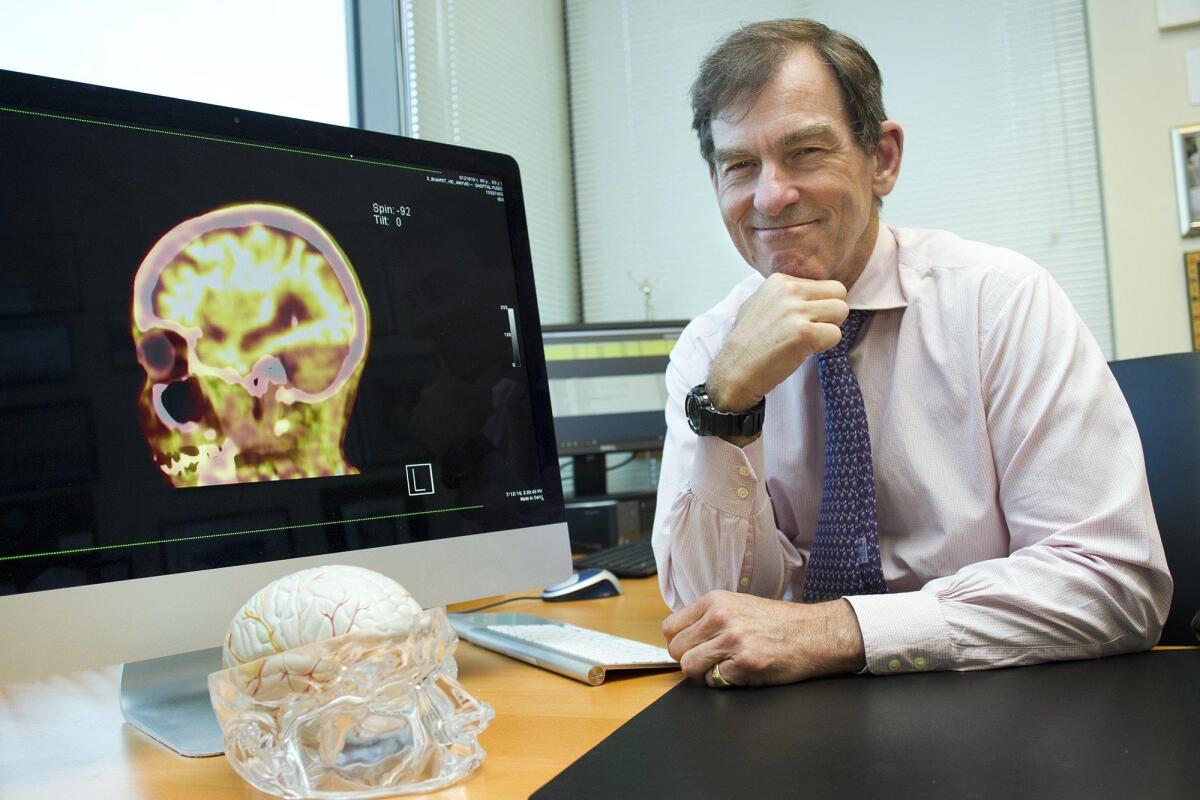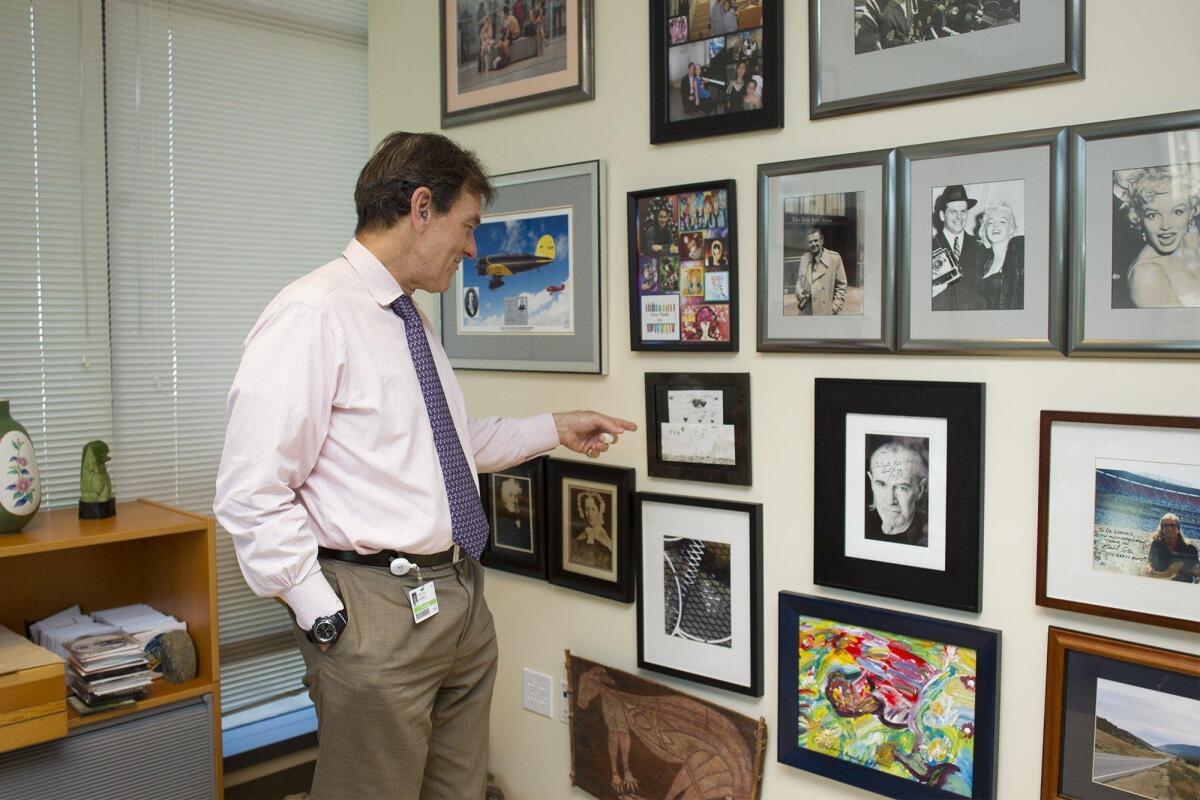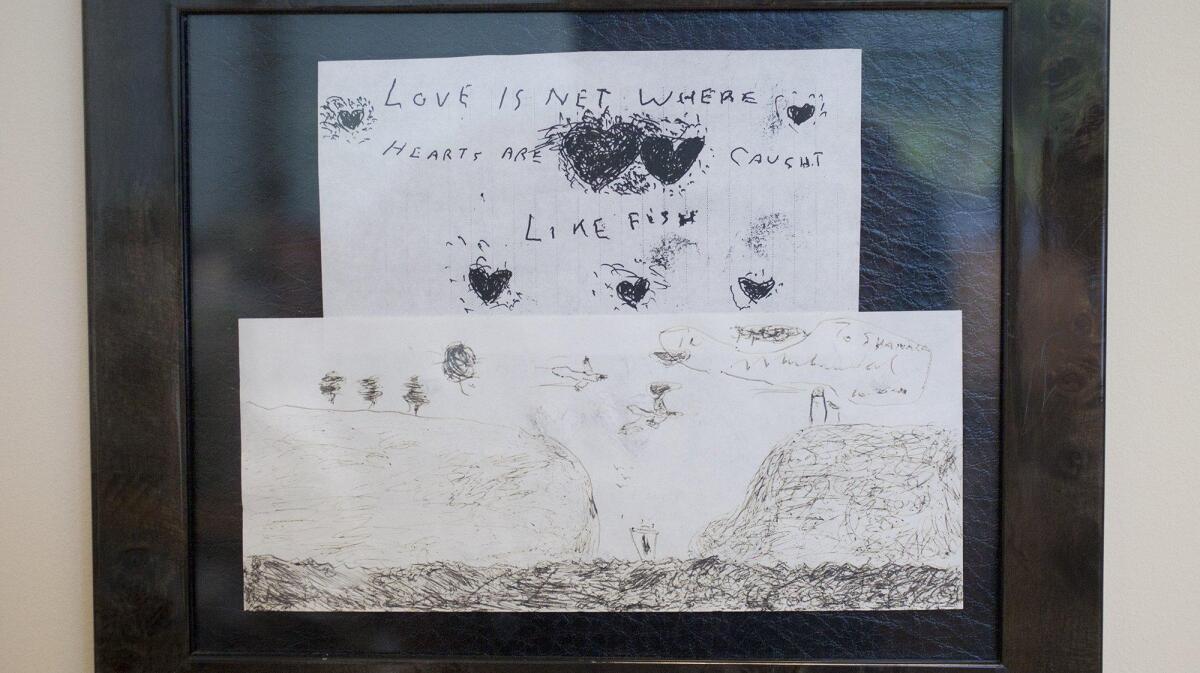Newport doctor who has overcome hearing loss is a finalist for national award

Dr. William Shankle, pictured in his office at Hoag Hospital in Newport Beach, is a finalist for the 2016 Oticon Focus on People Awards, which honor the accomplishments of people with hearing loss.
- Share via
William Shankle wore his first hearing aid when he was 17.
He had been losing his hearing since age 7, when he always had to sit at the front of his classrooms in school so he could hear the teachers.
Even then, he could hear only about half of what they said. He would go home after school and study the lessons again on his own.
But Shankle went on to attend UC Irvine and later Brown University medical school. He eventually became a neurologist in Newport Beach, specializing in diagnosis and management of Alzheimer’s disease. He co-founded the Alzheimer’s Research Clinic at UCI and established a community-based dementia program called the Shankle Clinic.
His work and perseverance inspired an audiologist in Corona del Mar to nominate him for an Oticon Focus on People Award, a national competition that recognizes those who help disprove negative stereotypes associated with hearing loss.
Shankle, 61, is one of three finalists in the awards’ adult category.

Dr. William Shankle’s office at Hoag Hospital in Newport Beach contains photos and artworks given to him as gifts by his patients.
“We all fear aging, and [hearing loss] is one more thing to add to the list of things going on as we get older: your vision, you can’t run as fast, you start to forget things,” said Donna Cody, who recommended Shankle for the award. Cody has been an audiologist — a doctor who helps patients manage hearing loss — for 30 years. Shankle has been one of her patients for 10 years.
“I nominated Dr. Shankle because he’s a big advocate for hearing and making sure he’s looking after brain health and hearing health as well,” Cody said.
Votes submitted by the public at oticon.com will determine the first-, second- and third-place honorees in the competition. Other categories are student, hearing-care practitioner and advocacy.
Voting closes Aug. 15. The winners will be announced in September.
Conquering hearing loss
With a strong family history of hearing loss on his mother’s side, Shankle knew at a young age that his ears would follow suit. But he said he “never thought about it much.” Mishearing became part of everyday life.
“When I was growing up and would listen to songs on the radio, I never got the words right so I’d make up my own lyrics. … I always thought my lyrics were better,” Shankle said with a laugh.
Shankle’s great-grandmother would place a horn against her ear so she could hear. There were no hearing aids in her day, he said.
His grandmother had a hearing aid, but she needed to carry two 10-pound battery packs on each of her legs to keep the device powered up.
In junior high school, Shankle saw a speech therapist to work through a stutter he didn’t know he had because he couldn’t hear it.
He didn’t get his first hearing aid until he was 17 because the technology hadn’t been developed until then.
After graduating from high school, he spent one year at UC Irvine, where he took a class at every department, including dance. He wasn’t sure what he wanted to be just yet, he said.
He then transferred to Stanford University and later attended USC and Harvard.
As a statistician at Boston Children’s Hospital, he found an affinity for patient interaction.
In 1998, he and his stepfather Benjamin Landing shared their discovery that the human brain can add new neurons. This overturned the idea that humans don’t get new nerve cells after birth, Shankle said.
In 2000, he co-founded the Alzheimer’s Research Clinic and started the Shankle Clinic.
His Newport Beach office is adorned with artwork given to him by patients over the years, including a drawing that one patient with Parkinson’s disease scribbled while Shankle was examining him.
He drew a lighthouse on a cliff and hearts with the words “Love is a net where hearts are caught like fish.” He signed the drawing with his name: Muhammad Ali.

Drawings by boxing legend Muhammad Ali are framed on a wall in Dr. William Shankle’s office in Newport Beach. Ali, who died in June, created the drawings as he was being examined by Shankle in October 2010.
Better help for the hard of hearing
Technology for hearing loss has become better in the past three or four years, Shankle said.
Bluetooth in his hearing aid enables him to receive cellphone calls and TV sound through the device at the volume he needs.
Without his hearing aid, he can’t hear anything these days.
“[Hearing loss] does convey a negative stereotype, because if you misunderstand and respond to something a person didn’t say, it makes other people think maybe you’re not that smart,” Shankle said.
“But why do people try to disguise it?” he said of hearing aids. “Why not make it a fashion piece? There is an alternative to hearing things wrong.”
--
Alex Chan, [email protected]
Twitter: @AlexandraChan10
